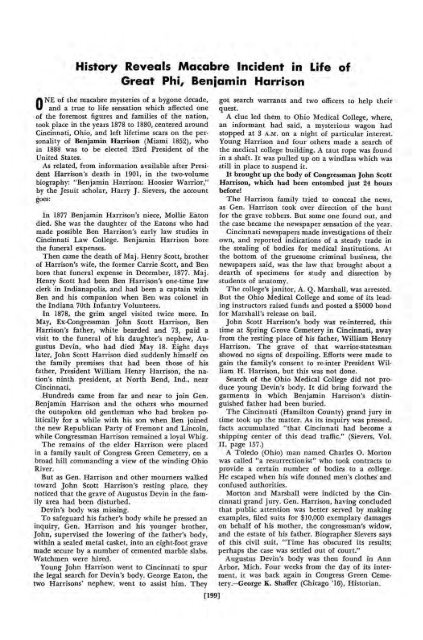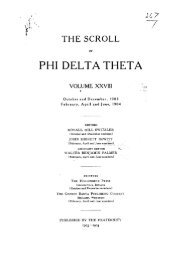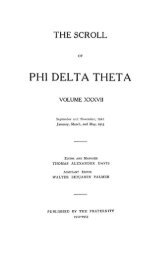1964–65 Volume 89 No 1–5 - Phi Delta Theta Scroll Archive
1964–65 Volume 89 No 1–5 - Phi Delta Theta Scroll Archive
1964–65 Volume 89 No 1–5 - Phi Delta Theta Scroll Archive
- No tags were found...
Create successful ePaper yourself
Turn your PDF publications into a flip-book with our unique Google optimized e-Paper software.
History Reveals Macabre Incident in Life ofGreat <strong>Phi</strong>, Benjamin HarrisonONE of the macabre mysteries of a bygone decade,and a true to life sensation which affected oneof the foremost figures and families of the nation,took place in the years 1878 to 1880, centered aroundCincinnati, Ohio, and left lifetime scars on the personalityof Benjamin Harrison (Miami 1852), whoin 1888 was to be elected 23rd President of theUnited States.As related, from information available after PresidentHarrison's death in 1901, in the two-volumebiography: "Benjamin Harrison: Hoosier Warrior,"by the Jesuit scholar, Harry J. Sievers, the accountgoes:In 1877 Benjamin Harrison's niece, MoUie Eatondied. She was the daughter of the Eatons who hadmade possible Ben Harrison's early law studies inCincinnati Law College. Benjamin Harrison borethe funeral expenses.Then came the death of Maj. Henry Scott, brotherof Harrison's wife, the former Carrie Scott, and Benbora that funeral expense in December, 1877. Maj.Henry Scott had been Ben Harrison's one-time lawclerk in Indianapolis, and had been a captain withBen and his companion when Ben was colonel inthe Indiana 70th Infantry Volunteers.In 1878, the grim angel visited twice more. InMay, Ex-Congressman John Scott Harrison, BenHarrison's father, white bearded and 73, paid avisit to the funeral of his daughter's nephew, AugustusDevin, who had died May 18. Eight dayslater, John Scott Harrison died suddenly himself onthe family premises that had been those of hisfather. President William Henry Harrison, the nation'sninth president, at <strong>No</strong>rth Bend, Ind., nearCincinnati.Hundreds came from far and near to join Gen.Benjamin Harrison and the others who mournedthe outspoken old gentleman who had broken politicallyfor a while with his son when Ben joinedthe new Republican Party of Fremont and Lincoln,while Congressman Harrison remained a loyal Whig.The remains of the elder Harrison were placedin a family vault of Congress Green Cemetery, on abroad hill commanding a view of the winding OhioRiver.But as Gen. Harrison and other mourners walkedtoward John Scott Harrison's resting place, theynoticed that the grave of Augustus Devin in the familyarea had been disturbed.Devin's body was missing.To safeguard his father's body while he pressed aninquiry. Gen. Harrison and his younger brother,John, supervised the lowering of the father's body,within a sealed metal casket, into an eight-foot gravemade secure by a number of cemented marble slabs.Watchmen were hired.Young John Harrison went to Cincinnati to spurthe legal search for Devin's body. George Eaton, thetwo Harrisons' nephew, went to assist him. They[199]got search warrants and two officers to help theirquest.A clue led them to Ohio Medical College, where,an informant had said, a mysterious wagon hadstopped at 3 A.M. on a night of particular interest.Young Harrison and four others made a search ofthe medical college building. A taut rope was foundin a shaft. It was pulled up on a windlass which wasstill in place to suspend it.It brought up the body of Congressman John ScottHarrison, which had been entombed just 24 hoursbefore!The Harrison family tried to conceal the news,as Gen. Harrison took over direction of the huntfor the grave robbers. But some one found out, andthe case became the newspaper sensation of the year.Cincinnati newspapers made investigations of theirown, and reported indications of a steady trade inthe stealing of bodies for medical institutions. Atthe bottom of the gruesome criminal business, thenewspapers said, was the law that brought about adearth of specimens for study and dissection bystudents of anatomy.The college's janitor, A. Q. Marshall, was arrested.But the Ohio Medical College and some of its leadinginstructors raised funds and posted a $5000 bondfor Marshall's release on bail.John Scott Harrison's body was re-interred, thistime at Spring Grove Cemetery in Cincinnati, awayfrom the resting place of his father, William HenryHarrison. The grave of that warrior-statesmanshowed no signs of despoiling. Efforts were made togain the family's consent to re-inter President WilliamH. Harrison, but this was not done.Search of the Ohio Medical College did not produceyoung Devin's body. It did bring forward thegarments in which Benjamin Harrison's distinguishedfather had been buried.The Cincinnati (HamUton County) grand jury inrime took up the matter. As its inquiry was pressed,facts accumulated "that Cincinnati had become ashipping center of this dead traffic." (Sievers, Vol.II, page 157.)A Toledo (Ohio) man named Charles O. Mortonwas called "a resurrectionist" who took contracts toprovide a certain number of bodies to a college.He escaped when his wife donned men's clothes" andconfused authorities.Morton and Marshall were indicted by the Cincinnatigrand jury. Gen. Harrison, having concludedthat public attention was better served by makingexamples, filed suits for $10,000 exemplary damageson behalf of his mother, the congressman's widow,and the estate of his father. Biographer Sievers saysof this civil suit, "Time has obscured its results;perhaps the case was settled out of court."Augustus Devin's body was then found in AnnArbor, Mich. Four weeks from the day of its interment,it was back again in Congress Green Cemetery.—GeorgeK. Shaffer (Chicago '16), Historian.
















